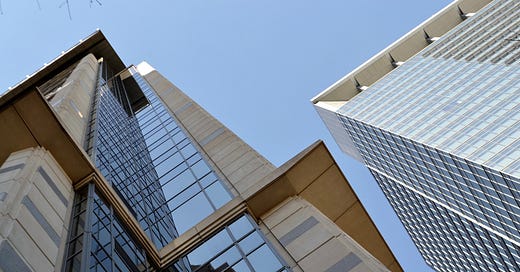FinCEN last week released an alert about sanctioned Russian elites, oligarchs, and their proxies investing in US commercial real estate (CRE).
This is nothing new. Foreign oligarchs and kleptocrats have long used the US real estate sector to hide assets, launder money, and evade sanctions. Malign actors from Venezuela to Russia have been buying up luxury real estate in cities from Miami to New York to Dallas to Los Angeles, prompting FinCEN in 2016 to issue Geographic Targeting Orders (GTOs) requiring US title insurance companies to identify the natural persons behind shell companies used to pay “all cash” for high-end residential real estate in six major metropolitan areas.
The GTOs have been renewed every six months since then and now include Boston; Chicago; Dallas-Fort Worth; Las Vegas; Los Angeles; Miami; New York City; San Antonio; San Diego; San Francisco; Seattle, the District of Columbia, Northern Virginia, and Maryland (DMV) area; as well as the City and County of Baltimore, the County of Fairfield, Connecticut, and the Hawaiian islands of Honolulu, Maui, Hawaii, and Kauai.
A Global Financial Integrity report in 2021 also noted the ease with which kleptocrats and other illicit actors to use US real estate to launder billions of dollars in illicit profits and assessed that GTOs are not a sufficient tool to stem the flow of dirty money into US real estate.
So none of this is a surprise.
But the current alert specifically focuses on the CRE sector and lists some unique challenges. The commercial real estate market is relatively stable, and the high value of CRE properties is a draw for Russian elites who have assets to hide. In addition these properties can generate rental income for the owners, making them additionally attractive.
And because commercial real estate transactions are usually complex, involving LLCs, trusts, and other legal entities to limit tax and legal liabilities, these transactions become more difficult for financial institutions to analyze.
In addition, several layers of legal entities are frequently involved as CRE buyers or sellers, and they may be domiciled in offshore jurisdictions. Further, these legal entities often have a large number of investors behind them and, as a result, it can be difficult for a financial institution to identify all of the beneficial owners.
The use of layers of shell companies, trusts, and other entities that help obscure ownership and control by sanctioned Russian individuals is not unusual in commercial real estate transactions, and these tangled ownership webs generally would not raise red flags, especially given the outsized number of foreign investors that are usually involved in CRE transactions in the United States.
So how can a US financial institution identify possible red flags of sanctions evasion by sanctioned Russian elites, given that many of the methodologies used are already common in legitimate CRE transactions?
Research. Lots and lots of research.
Know your customers and their business.
Monitor changes.
Implement processes based on your risk assessment.
If a pooled investment vehicle—an entity created for investors to pool money for the purchase of the property—is used, who are the individual investors? There may be several, and all will probably own a small percentage of the fund, but who are they? Do any of them have links to sanctioned Russian oligarchs or their families?
Shell companies and trusts are also often used to purchase CRE properties. These structures are common, so their use alone may not be particularly suspicious, but coupled with other red flags, their jurisdiction, ownership, and control should be examined closely.
The use of third parties is also a common sanctions evasion technique. Are these third parties related to sanctioned Russian oligarchs? Are they linked to sanctioned elites? Sanctioned Russian billionaire Oleg Deripaska in 2018 gave his cousin, Pavel Ezubov, control of Terra Services, a real estate firm that was linked to the Mueller investigation. Ezubov also incorporated Hestia International, LLC, which owned Deripaska’s property in Washington, DC that was searched by the FBI in 2021.
Deripaska, Open Sanctions confirms, has transferred large assets to his cousin Pavel Ezubov, including several properties in France, using a holding company owned by Ezubov; a hotel in Lech, Austria, through the Russian-based, Ezubov-owned holding company Gost Hotel Management LLC; and the control of the company Terra Limited.
Ezubov is not sanctioned by the United States—only by the UK, Canada, individual EU countries, and Ukraine. He’s the CEO of:
KAPPA LLC
Poliaron LLC
Investitsii v Obrazovanie LLC
Radger-Invest LLC
АО "ВОЗРОЖДЕНИЕ"
non-profit foundation "Fidelitas"
Slavrealty s. r. o.
Is it technically legal to transact with Ezubov in the United States? Yes. He’s not sanctioned here. Is it smart, knowing that he is holding assets for a sanctioned Russian oligarch and is related to him? Not so much.
That’s why a risk-based approach to the research is critical.
Who are the beneficial owners of the shell companies involved in the CRE transactions? Do they have PEP links? Are there family members or close associates involved?
Are the investment vehicles located in multiple, foreign, risky jurisdictions?
Is the purchase or investment in a property with limited discernable business value or is it outside of the client’s normal business operations?
One red flag alone may not be indicative of suspicious activity, but a combination of these suspicious signs needs closer examination.





We used to call it “playing whack-a-mole” when I was at Treasury. As soon as you whack one of them, they find a new way. It does get frustrating.
Excellent article and as the oligarchs try to hide/move what few assets that haven't been frozen, they will only get MORE creative!